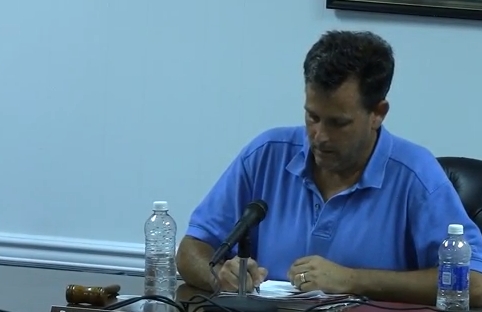The Rock Hall Town Council voted 3-0 Monday to draft a charter amendment that would clear the way for a recall election of Mayor Robert Willis — and force him from office before his term expires in April of 2015.
“I’d like to make a motion to direct the town attorney to draft a charter amendment resolution for recall for our consideration,” said Councilman Olin “Butch” Price, after a closed session Monday night with the town attorney, Charles “Chip” MacLeod.
Willis did not attend the closed session on the grounds that it was not advertised and therefore illegal. MacLeod said that a closed meeting was legal upon a majority vote of the council.
If passed, the amendment would designate a percentage of voter signatures required to hold a special recall election. In Brunswick, Maryland, for example, at least 25 percent of all eligible voters most sign a petition to hold a recall election.
In the meantime, another motion passed that bars Willis from conducting any further official business on behalf of the town without first seeking majority approval from the council, which means he may no longer correspond on his official letterhead or communicate in any official manner with businesses or government agencies without the council’s prior authorization.
“Given the unfortunate events that our town has suffered through over the past several months, we are particularly concerned with the town’s exposure to risk, liabilities, and quite frankly, further embarrassment due to the unauthorized actions of a single elected official who holds the title of mayor and who appears to be using that title to gain advantage or deference,” Price said, reading from a letter that was hand delivered to Willis by a Rock Hall police officer on Tuesday.
Councilmen Price, Brian Nesspor, and Brian Jones voted in favor of both motions. Councilwoman Susan Francis was absent for a second straight week.
The vote follows a long train of clashes between Willis and the council that began on April 28 — when he unsuccessfully challenged the integrity of Price and Town Manager Ron Fithian. In the weeks that followed, Willis failed in an attempt to fire MacLeod as the town attorney, and lost management authority of the Clerks Office when he tried to pressure Treasurer Stephanie Loller to hand over her passwords to the town’s online banking system – against legal advice. Willis also lost supervisory powers of the transportation and police departments.
Price said that Willis’ has had many communications with vendors and outside agencies without the knowledge or support of the council.
“There were numerous letters that he had written to several vendors asking very odd questions and wanting to see things that the council had no idea [for] his reasoning,” Price said. “He was trying to play a private investigator…representing himself as the mayor of the town. When you normally do that, the vendor feels that he has the council’s support. In this case he had none of the council’s support.”
The final straw for Price was when Willis and a private citizen met with the town’s auditor while an audit was underway.
“Before the auditor even had an opportunity to come in and confer with us, he was meeting with the auditor for three hours in private,” Price said. “I consider that highly unethical.”
Willis was warned in the letter that steps would be taken to prevent him from acting without the council’s approval.
“If necessary and appropriate to protect or advance the interests of the town, we will notify parties doing business with the town or whom may be expected to do business with the town (including governmental agencies and officials, contractors, professional consultants , vendors, and town citizens) of the limitations on the office of mayor in terms of representing the town, acting on behalf of the town or obligating the town without the authorization of a majority of the Town Council,” the letter said.
In the video below, Jones and Price discuss the circumstances that led to Monday’s votes. The video is a little over five minutes.



Bill Anderson says
This town council is now on the right track — if you are unable to otherwise control or contain an obstinant mayor, it becomes imperative that there be a legal means of removing him from office!
MBTroup says
All the drama notwithstanding, a point of order question:
If a legislature’s raise cannot take effect until the next term has begun, can’t the same logic be used for creating ordinances that remove elected officials? If the town attorney reeeeeeeeeeeeeeeeeeeeeeally hates the Mayor, couldn’t he just say “Yeah, um, it’ll take five signatures to recall him.”